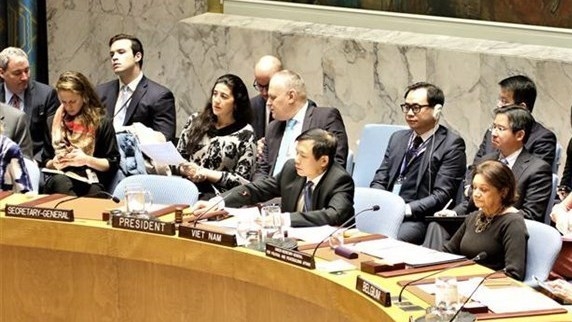In the first six months of 2020, both the region and the world continued to witness rapid and complicated changes. While many long-running conflicts in the Middle East and Africa having not found a radical solution, many hot spots are at risk of flaring, even in the Asian-Pacific region. Peace, cooperation and development remain the mainstream, however, multilateralism, and regional and global mechanisms, are still facing many obstacles. Conflicts between a number of great powers have spread to multilateral fora, and even to the United Nations.
But, as outlined by United Nations’ Secretary-General Antonio Guterres, the COVID-19 pandemic is the biggest challenge the world has faced since the Second World War. In the history of the modern world, the international community has never faced a non-traditional security challenge, having such a wide-ranging impact that is so difficult to control both in scope and scale as is currently the case.

Ambassador Dang Dinh Quy, Permanent Representative of Vietnam to the UN, taps the gavel to start a debate. (Photo: VNA)
The COVID-19 pandemic has profoundly affected all aspects of international life, and of course, the activities of the UN Security Council. After three months of temporary lockdown due to the disease, the UN Security Council has adapted to the “new normal”, operating via online meetings and applying situational measures in consultation, negotiations and remote voting.
Despite many difficulties and great challenges, the UN Security Council. has still completed a large workload, with about 200 meetings and discussions, and hundreds of negotiations on documents at different levels, about a huge variety of problems across all continents and regions. In the past six months, nearly 70 important documents, including resolutions of the Security Council, the Presidential statement and notices, were adopted by the Council, on many topics such as international peace and security, anti-terrorism, climate change adaptation, humanitarian aid, children in armed conflicts, gender equality, etc.
In 2020, Vietnam took over the dual role of ASEAN Chair and non-permanent membership of the UN Security Council. Vietnam has a great opportunity to participate and contribute to the international community, and at the same time show bravery and assert its national position. In an effort to promote common interests, Vietnam has made a good impression upon its joining of the UN Security Council.
As the President of the UN Security Council in January 2020, Vietnam chaired and operated many regular and irregular tasks, such as official meetings, consultations, and discussed decisions and resolutions of the Council. As the Coordinator of the 10 non-permanent member countries of the United Nations Security Council (E10), Vietnam has played an active role while actively promoting online meetings between E10 and the UN Secretary-General.
In particular, two outstanding initiatives have attracted the special attention of the international community. The first is the Ministerial Open Debate of the United Nations Security Council entitled “Toward the 75th Anniversary of the United Nations: Upholding the UN Charter to Maintain International Peace and Security”, chaired by the Deputy Prime Minister and Minister of Foreign Affairs of Vietnam, with the participation of over 100 speakers. The statement drafted by Vietnam was approved by the UN Security Council, affirming the UN Charter’s sustainable value. This is the first time the Security Council has approved a separate presidential statement on compliance with the UN Charter.
The second was the meeting on cooperation between the UN and ASEAN and this is the first time this topic was discussed at the UN Security Council. Here, the UN Secretary-General, the ASEAN Secretary General and leaders of other countries highly lauded ASEAN's achievements in development and integration, maintenance of peace and stability in the region and its contribution to the international community. The success of this event reflected Vietnam's initiative to promote comprehensive and effective cooperation between the UN and ASEAN, strengthening the connection between the ASEAN Community’s Vision and the UN’s sustainable development goals.
In its second time holding a position as a non-permanent member of the United Nations (UN) Security Council, Vietnam continued to participate and contribute to the common work on the basis of its steadfast foreign policy of independence, self-reliance, openness, diversification and the multilateralisation of external relations; with a constructive, responsible and balancing spirit; making clear its support for and upholding of the UN Charter and international law; fostering dialogue, reducing tensions and confrontation, finding fair and equitable solutions through negotiations for conflicts, as well as issues that threaten regional and international peace and security.
The active and positive imprint of Vietnam in its first stage at the UN Security Council are a solid foundation, creating favourable conditions for the country to continue to participate and make practical contributions to maintaining international peace and security and a stable environment for development.

Comment
Print